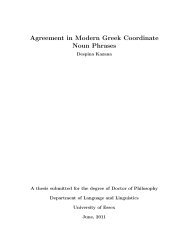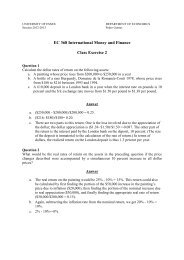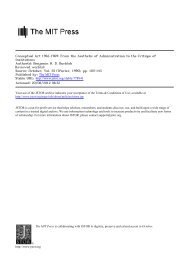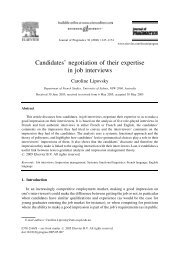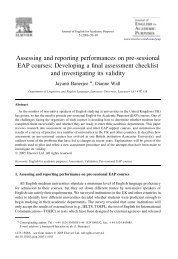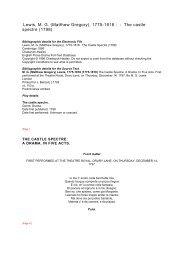LG204 background.pdf
LG204 background.pdf
LG204 background.pdf
Create successful ePaper yourself
Turn your PDF publications into a flip-book with our unique Google optimized e-Paper software.
<strong>LG204</strong>-5-FY ENGLISH PHONETICS AND PHONOLOGY Background<br />
Stops which precede other consonants or those which occur pre-pausally are not<br />
released. This is because the articulators are already anticipating the following sound<br />
and are forming into that sound. Release, if we can describe it as such, therefore,<br />
merely spills into the following sound. Examples of words where there are two<br />
adjacent stops include apt fact etc. The diacritic that denotes no release is hence nap<br />
[np].<br />
Lack of release can apply to stops in any dialect of English, however, for many of us<br />
there is a further variant on the final /t/ in particular (sometimes also on /p/ and /k/).<br />
This the glottal stop []. In non-prevocalic position, these stops may either be preglottalised<br />
– that is to say that a glottal stop precedes or accompanies the stop<br />
articulation, as in cap [k p]. Pre-glottalisation may also occur with /t/ but here it is<br />
more likely that the alveolar contact will be totally lost here, leaving the glottal stop as<br />
a substitute, as in cat [k]. The extent to which /t/ is replaced by a glottal stop and in<br />
what position in the word, will vary from speaker to speaker and from dialect to<br />
dialect. Ladefoged, who is primarily writing about American English, says that it’s<br />
very likely to happen before a syllabic nasal in a word like button [bIt is also<br />
very common syllable finally in words such as Scotland [sklnd], Watford [wfd]<br />
and Gatwick [gwk].<br />
Alveolar stops may also be released into a following nasal or lateral consonant. That<br />
is to say that in words like sudden instead of releasing the contact for the [d] it<br />
remains in its position and air is channelled through the nose. Likewise, in a word<br />
such as muddle the sides of the tongue will be lowered whilst the alveolar contact<br />
remains in place. I have discussed these phenomena with regard to voiced [d], but, of<br />
10




